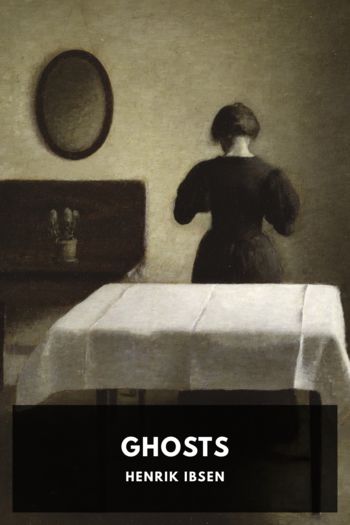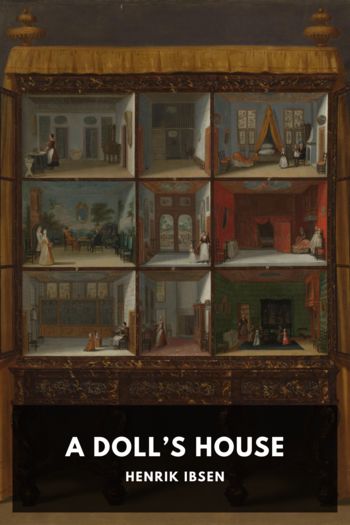Ghosts by Henrik Ibsen (best novels of all time .TXT) 📕

- Author: Henrik Ibsen
Book online «Ghosts by Henrik Ibsen (best novels of all time .TXT) 📕». Author Henrik Ibsen
By Henrik Ibsen.
Translated by William Archer.
Table of Contents Titlepage Imprint Introduction Dramatis Personae Ghosts Act I Act II Act III Endnotes Colophon Uncopyright ImprintThis ebook is the product of many hours of hard work by volunteers for Standard Ebooks, and builds on the hard work of other literature lovers made possible by the public domain.
This particular ebook is based on a transcription produced for Project Gutenberg and on digital scans available at the Internet Archive.
The writing and artwork within are believed to be in the U.S. public domain, and Standard Ebooks releases this ebook edition under the terms in the CC0 1.0 Universal Public Domain Dedication. For full license information, see the Uncopyright at the end of this ebook.
Standard Ebooks is a volunteer-driven project that produces ebook editions of public domain literature using modern typography, technology, and editorial standards, and distributes them free of cost. You can download this and other ebooks carefully produced for true book lovers at standardebooks.org.
IntroductionThe winter of 1879–80 Ibsen spent in Munich, and the greater part of the summer of 1880 at Berchtesgaden. November 1880 saw him back in Rome, and he passed the summer of 1881 at Sorrento. There, fourteen years earlier, he had written the last acts of Peer Gynt; there he now wrote, or at any rate completed, Gengangere.
The surviving “foreworks” for this play are very scanty. Of the dialogue only two or three brief fragments remain. The longest is a sketch of the passage in which Oswald shocks Pastor Manders by his account of artist life in Paris. We possess, however, some scattered memoranda relating to the play, some of them written on the back of an envelope addressed to “Madame Ibsen, 75 via Capo le Case, Cittè” (that is to say, Rome). They run as follows:
The piece will be like an image of life. Faith undermined. But it does not do to say so. “The Asylum”—for the sake of others. They shall be happy—but this also is only an appearance—it is all ghosts.
One main point. She has been believing and romantic—this is not wholly obliterated by the stand-point afterwards attained—“It is all ghosts.”
It brings a Nemesis on the offspring to marry for external reasons, even if they be religious or moral.
She, the illegitimate child, may be saved by being married to—the son—but then—?
He was in his youth dissipated and worn out; then she, the religiously awakened, appeared; she saved him; she was rich. He had wanted to marry a girl who was thought unworthy. He had a son in his marriage; then he returned to the girl; a daughter—
These women of today, ill-treated as daughters, as sisters, as wives, not educated according to their gifts, withheld from their vocation, deprived of their heritage, embittered in mind—these it is who furnish the mothers of a new generation. What will be the consequence?
The fundamental note shall be the richly flourishing spiritual life among us in literature, art, etc.; and then, as a contrast, all humanity astray on wrong paths.
The complete human being is no longer a natural product, but a product of art, as corn is, and fruit trees, and the creole race, and the higher breeds of horses and dogs, the vine, etc.
The fault lies in the fact that all humanity has miscarried. When man demands to live and develop humanly, it is megalomania. All humanity, and most of all the Christians, suffer from megalomania.
Among us we place monuments over the dead, for we recognise duties towards them; we allow people only fit for the hospital (literally, lepers) to marry: but their offspring—? The unborn—?
The fourth and fifth of these six sections seem to have as much bearing on other plays—for instance, An Enemy of the People, and The Lady from the Sea—as on Ghosts. I should take them rather for general memoranda than for notes specially referring to this play.
Gengangere was published in December 1881, after he had returned to Rome. On December 22 he wrote to Ludwig Passarge, one of his German translators, “My new play has now appeared, and has occasioned a terrible uproar in the Scandinavian press; every day I receive letters and newspaper articles decrying or praising it. … I consider it utterly impossible that any German theatre will accept the play at present. I hardly believe that they will dare to play it in the Scandinavian countries for some time to come.” How rightly he judged we shall see anon.
In the newspapers there was far more obloquy than praise. Two men, however, stood by him from the first: Björnson, from whom he had been practically estranged ever since The League of Youth, and Georg Brandes. The latter published an article in which he declared (I quote from memory) that the play might or might not be Ibsen’s greatest work, but that it was certainly his noblest deed. It was, doubtless, in acknowledgment of this article that Ibsen wrote to Brandes on January 3, 1882: “Yesterday I had the great pleasure of receiving your brilliantly clear and so warmly appreciative review of Ghosts. … All who read your article must, it seems to me, have their eyes opened to what I meant by my new book—assuming, that is, that they have any wish to see. For I cannot get rid of the impression that a very large number of the false interpretations which have appeared in the newspapers are the work of people who know better. In Norway, however, I am willing to believe that the stultification has in most cases been unintentional; and the reason is not far to seek. In that country a great many of the critics are theologians, more or less disguised; and these gentlemen are, as a rule, quite unable to write rationally about





Comments (0)